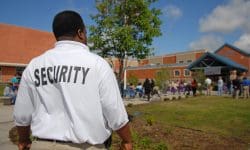FBI Director James Comey Discusses Race and Law Enforcement
Comey calls on police and the citizens they serve to participate in a frank and open conversation about the disconnect between law enforcement and many citizens, particularly in communities of color.
In February 2015, FBI Director James B. Comey spoke at Georgetown University, calling on law enforcement and the citizens they serve to participate in a frank and open conversation about the disconnect that exists in places like New York City and Ferguson, Missouri-and communities across the country-between police agencies and many citizens, particularly in communities of color.
This video has almost become required watching in roll call briefings for both campus and municipal policing across the country. Here’s the transcript of Comey’s speech:
Thank you, President DeGioia. And good morning, ladies and gentlemen. Thank you for inviting me to Georgetown University. I am honored to be here. I wanted to meet with you today, as President DeGioia said, to share my thoughts on the relationship between law enforcement and the diverse communities we serve and protect. Like a lot of things in life, that relationship is complicated. Relationships often are.
Beautiful Healy Hall-part of, and all around where we sit now-was named after this great university’s 29th President, Patrick Francis Healy. Healy was born into slavery, in Georgia, in 1834. His father was an Irish immigrant plantation owner and his mother, a slave. Under the laws of that time, Healy and his siblings were considered to be slaves. Healy is believed to be the first African-American to earn a Ph.D., the first to enter the Jesuit order, and the first to be president of Georgetown University or any predominantly white university.
Given Georgetown’s remarkable history, and that of President Healy, this struck me as an appropriate place to talk about the difficult relationship between law enforcement and the communities we are sworn to serve and protect.
With the death of Michael Brown in Ferguson, the death of Eric Garner in Staten Island, the ongoing protests throughout the country, and the assassinations of NYPD Officers Wenjian Liu and Rafael Ramos, we are at a crossroads. As a society, we can choose to live our everyday lives, raising our families and going to work, hoping that someone, somewhere, will do something to ease the tension-to smooth over the conflict. We can roll up our car windows, turn up the radio and drive around these problems, or we can choose to have an open and honest discussion about what our relationship is today-what it should be, what it could be, and what it needs to be-if we took more time to better understand one another.
Current Issues Facing Law Enforcement
Unfortunately, in places like Ferguson and New York City, and in some communities across this nation, there is a disconnect between police agencies and many citizens-predominantly in communities of color.
Serious debates are taking place about how law enforcement personnel relate to the communities they serve, about the appropriate use of force, and about real and perceived biases, both within and outside of law enforcement. These are important debates. Every American should feel free to express an informed opinion-to protest peacefully, to convey frustration and even anger in a constructive way. That’s what makes our democracy great. Those conversations-as bumpy and uncomfortable as they can be-help us understand different perspectives, and better serve our communities. Of course, these are only conversations in the true sense of that word if we are willing not only to talk, but to listen, too.
I worry that this incredibly important and incredibly difficult conversation about race and policing has become focused entirely on the nature and character of law enforcement officers, when it should also be about something much harder to discuss. Debating the nature of policing is very important, but I worry that it has become an excuse, at times, to avoid doing something harder.
The Hard Truths
Let me start by sharing some of my own hard truths:
If you appreciated this article and want to receive more valuable industry content like this, click here to sign up for our FREE digital newsletters!
 Leading in Turbulent Times: Effective Campus Public Safety Leadership for the 21st Century
Leading in Turbulent Times: Effective Campus Public Safety Leadership for the 21st Century
This new webcast will discuss how campus public safety leaders can effectively incorporate Clery Act, Title IX, customer service, “helicopter” parents, emergency notification, town-gown relationships, brand management, Greek Life, student recruitment, faculty, and more into their roles and develop the necessary skills to successfully lead their departments. Register today to attend this free webcast!













